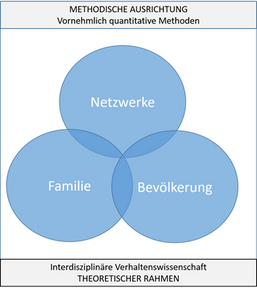Research
Research
Research
My research spans three focal areas--networks, population, and family—with links between these areas in some of my research projects. These focal areas are framed by a methodological perspective that draws mainly on quantitative social research methods and, theoretically, by an interdisciplinary behavioral science that draws on insights from the social sciences, biology, and other natural sciences.
Network Research
One project within this focal area builds on existing research on complex networks, with a particular focus on the so-called “small-world phenomenon” (“six degrees of separation”). Research in this area has shown how very different types of networks—e.g. biological, technological, and social networks—share similar structural and dynamic properties. This insight has encouraged an interdisciplinary exchange of ideas about methods and concepts and, in turn, has reinvigorated disciplinary approaches in a variety of scientific disciplines. In a book, edited in 2013 and published by SAGE, I contributed to this interdisciplinary approach by bringing together contributions from the natural and social sciences, as well as from computer science and engineering. Furthermore, I have contributed to the methodological and theoretical advancement of small-world research and am currently applying the concepts and methods from this interdisciplinary field to issues in organizational psychology and cultural analysis.
Family Research
One project in this focal area is on the meaning and consequences of social and biological parenthood. With several colleagues in Europe I have been examining the consequences for adolescents to grow up in step families, with a particular focus on the role of complexity in multi-household family structures. Additionally, we have been comparing the social support networks of parents and childless individuals in later life, asking if and how friends and other persons provide social support when close-family supporters are not available. Given increasing rates of divorce and remarriage, as well as the trend of aging populations, these questions are highly relevant for social policy. Thus, we have been working with cross-country comparisons to derive recommendations on how to enable strong and supportive social ties. Another family-related research project studies the co-determination of hormones, behavior, and social context across peoples’ life courses. As Research Associate at the Institute for Social and Economic Research (ISER) at the University of Essex (UK), and together with two Essex epidemiologists and economists, we collected data on a hormonal biomarker that we linked with existing socioeconomic data on the Innovation Panel of the nationally representative UK Understanding Society Study. After we successfully published two technical ISER reports that inform researchers on the available data, we are currently preparing a substantive paper that uses the data to gain insight on how hormones and social context co-shape behavior in a range of behavioral domains.
Population Research
In this focal area, demography, we are currently working on two projects. One is on the antecedents and consequences of biased sex ratios. In one set of papers, my collaborators and I show that supposed social context effects on sex ratios at birth are largely exaggerated and likely just reflect random fluctuations in sex ratios at birth. In a second set of papers, we explore the behavioral consequences of biased sex ratios at later ages and show that male-biased sex ratios are associated with higher rates of violent behavior—both in larger geographical contexts like municipalities and in micro-settings like school classes. The second project in this focal area involves work on a text book, introducing the tools and methods for comparative stratification and demographic research, with applications in the statistical software package R. Besides tools traditionally being used in these research areas, the book will also cover network analytical methods. Network analysis brings a relational perspective to this research area has traditionally been predominated by cross-country comparisons.
Furter research interests
- biosociology
- life course sociology
- quantitative methods of empirical social research
- social stratification


